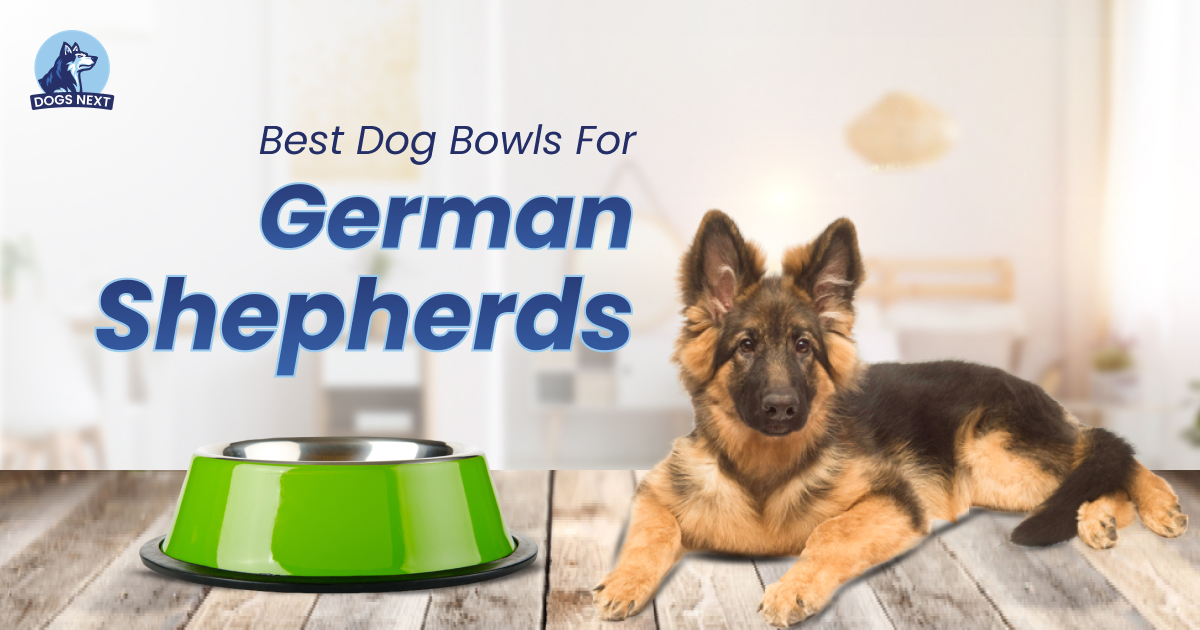German Shepherds are majestic and intelligent dogs that require special attention to their needs, including their feeding habits. One crucial aspect often overlooked is the selection of appropriate dog bowls.
When choosing a dog bowl for a German Shepherd, there are a few factors to consider, such as size, material, and design. The right dog bowl can contribute to their overall well-being and make feeding time more enjoyable.
In this comprehensive guide, we will delve into the unique needs of German Shepherds and provide valuable insights on how to choose the perfect dog bowl that meets their requirements. Whether you’re a new German Shepherd owner or looking to upgrade your current dog bowls, this article will equip you with the knowledge to make informed decisions.
Understanding German Shepherd’s Unique Needs
German Shepherds possess specific characteristics and need that make selecting the right dog bowl crucial. Their large size, deep chests, and long muzzles require bowls that accommodate their physical attributes.
German Shepherds are also known for their active nature, so the bowl should be sturdy and stable to prevent tipping over during mealtime. Moreover, they are prone to certain health conditions, such as bloat and hip dysplasia, which can be influenced by their feeding habits.
Optimal feeding is vital to ensure their well-being and prevent potential complications. By understanding these unique needs, you can make an informed decision when choosing a dog bowl for your German Shepherd.
Types of Dog Bowls for German Shepherds
When it comes to selecting a dog bowl for your German Shepherd, various types are available in the market. Here are the most common options:
| Type | Description |
| Stainless Steel | Durable, hygienic, and easy to clean. Resistant to bacteria growth and suitable for active dogs. |
| Ceramic | Offers aesthetic appeal, heavyweight, and stable. However, they may be prone to breakage. |
| Plastic | Affordable and lightweight. However, they may not be as durable and can be scratched easily. |
| Elevated | Raised bowls that promote better posture and digestion, are ideal for German Shepherds with joint or mobility issues. |
Consider your German Shepherd’s specific needs and preferences when choosing the right type of dog bowl.
Benefits of Stainless-Steel Dog Bowls
Stainless steel dog bowls are highly recommended for German Shepherds due to several advantages they offer. Some key benefits include:
Durability: Stainless steel bowls are resistant to scratches, cracks, and dents, ensuring long-lasting use.
Hygiene: They are easy to clean, preventing the buildup of bacteria and reducing the risk of food contamination.
Ease of Cleaning: Stainless steel bowls can be conveniently washed in the dishwasher or by hand, saving you time and effort.
Non-Toxic: They are free from harmful chemicals like BPA, ensuring the safety of your German Shepherd.
Considerations for Ceramic Dog Bowls
Ceramic dog bowls are another option to consider for your German Shepherd. They have their own set of pros and cons:
| Pros | Cons |
| Aesthetic Appeal | Ceramic bowls come in various designs and colors, adding a touch of style to your German Shepherd’s feeding area. |
| Weight | The heavyweight ceramic bowls provide stability, reducing the chances of tipping over during mealtime. |
However, there are a few potential drawbacks to be aware of:
Breakability: Ceramic bowls are prone to breakage, especially if accidentally dropped or subjected to rough handling.
Durability: They may not be as durable as other materials and can chip or crack over time.
Consider these factors when deciding whether ceramic bowls are the right choice for your German Shepherd.
Exploring Plastic Dog Bowls
Plastic dog bowls are a popular and affordable option, but they have some important considerations:
| Pros | Cons |
| Affordability | Plastic bowls are budget-friendly, making them an accessible choice for many German Shepherd owners. |
| Lightweight | The lightweight nature of plastic bowls makes them easy to handle and transport. |
It’s important to be aware of the following concerns:
Durability: Plastic bowls may not be as durable as other materials and can be prone to scratching, cracking, or breaking.
Safety: Some plastic bowls may contain harmful chemicals like BPA, which can leach into food and pose health risks for your dog.
When considering plastic bowls, weigh the pros and cons to make an informed decision for your German Shepherd.
The Importance of Elevated Dog Bowls
Elevated or raised dog bowls offer several benefits for German Shepherds:
Improved Digestion: Elevated bowls promote better posture during feeding, reducing the strain on your German Shepherd’s neck and aiding in proper digestion.
Posture and Comfort: The raised height of the bowls ensures a more comfortable feeding position, especially for larger German Shepherds.
Joint and Muscle Support: Elevated bowls can be beneficial for German Shepherds with joint issues or arthritis, as they minimize the need for excessive bending or stretching.
Consider using elevated bowls to enhance your German Shepherd’s feeding experience and support their overall well-being.
Choosing the Right Size and Capacity
Selecting the correct size and capacity for your German Shepherd’s dog bowl is crucial to ensure comfortable and adequate feeding. Consider the following factors when determining the appropriate size:
- Size and Breed: Take into account your German Shepherd’s size and breed standards. Larger breeds like German Shepherds require larger bowls to accommodate their food and prevent overcrowding.
- Age and Growth Stage: Puppies have different feeding requirements compared to adult German Shepherds. Choose a bowl that can accommodate their growing needs and adjust as they mature.
- Feeding Habits: Assess your German Shepherd’s eating habits. If they tend to eat quickly or have a larger appetite, opt for a bowl with a larger capacity to prevent spillage and allow them to eat comfortably.
By considering these factors, you can select a dog bowl that provides the right size and capacity for your German Shepherd’s feeding needs.
Non-Slip and Anti-Spill Features
When choosing a dog bowl for your German Shepherd, it’s essential to prioritize non-slip and anti-spill features. These features offer several benefits:
- Stability: Non-slip bases or grips help keep the bowl in place during mealtime, preventing your energetic German Shepherd from knocking it over.
- Cleanliness: Anti-spill features, such as raised edges or built-in spill-proof designs, minimize mess and keep food and water contained within the bowl, reducing clean-up efforts.
- Convenience: Non-slip and anti-spill features make feeding time easier and more efficient, allowing your German Shepherd to enjoy their meals without disruptions.
Consider these features to ensure a hassle-free feeding experience and a cleaner environment for both you and your German Shepherd.
Factors to Consider for German Shepherds with Special Needs
For German Shepherds with specific conditions or special needs, additional considerations should be taken into account when selecting a dog bowl. Here are a few examples:
- Hip Dysplasia: Raised or elevated bowls can help reduce strain on the hips and joints, providing a more comfortable feeding position for German Shepherds with hip dysplasia.
- Arthritis: Look for bowls with a lower rim height that doesn’t require excessive bending or stretching, supporting German Shepherds with arthritis.
- Megaesophagus: Dogs with megaesophagus may benefit from elevated feeders that allow them to eat in an upright position, aiding in the passage of food into the stomach.
Addressing these specific needs ensures that your German Shepherd can comfortably and safely enjoy their meals. Consult with your veterinarian for personalized recommendations based on your German Shepherd’s unique requirements.
Cleaning and Maintenance Tips for Dog Bowls
Proper cleaning and maintenance of your German Shepherd’s dog bowl are essential for their health and longevity. Here are some practical tips to ensure optimal hygiene:
Regular Cleaning:
Wash the dog bowl with warm water and mild dish soap after each use to remove food residue and bacteria. Avoid using harsh chemicals that could be harmful to your German Shepherd.
Deep Cleaning:
Periodically, give the bowl a deep clean by soaking it in a mixture of water and vinegar or using pet-safe cleaning solutions. Scrub away any stubborn stains or odors.
Avoid Food Contamination:
Separate your German Shepherd’s food and water bowls to prevent cross-contamination. Provide fresh water in a separate bowl throughout the day.
Replace Damaged Bowls:
Inspect the dog bowl regularly for any cracks, scratches, or signs of wear. Replace damaged bowls promptly to maintain hygiene and prevent potential injuries.
By following these cleaning and maintenance tips, you can ensure that your German Shepherd’s dog bowl remains clean and safe for their meals.
Budget-Friendly Options
If you’re looking for cost-effective alternatives for dog bowls without compromising quality, consider the following options:
Stainless Steel:
Stainless steel bowls are not only durable and hygienic but also often available at affordable prices. They offer excellent value for money.
Plastic Alternatives:
Instead of traditional plastic bowls, opt for BPA-free and food-grade plastic bowls that are more durable and safer for your German Shepherd.
Ceramic Bowls:
While some ceramic bowls can be pricey, there are budget-friendly options available that offer both style and functionality.
Remember to prioritize the quality and safety of the bowl, even when on a budget. Consider researching reputable brands or reading customer reviews to find affordable options that meet your German Shepherd’s needs.
Frequently Asked Questions
Q: What is the best bowl for a German Shepherd?
Ans: The best bowl for a German Shepherd would be a durable and hygienic stainless-steel bowl.
Q: What size bowl for a German Shepherd?
Ans: The size of the bowl for a German Shepherd should be large enough to comfortably accommodate their food and prevent overcrowding.
Q: Do German Shepherds need raised bowls?
Ans: Raised bowls can be beneficial for German Shepherds as they promote improved digestion, posture, and comfort, but they are not necessary for all dogs.
Q: German shepherd food bowl height?
Ans: The food bowl height for a German Shepherd will depend on their specific needs, but it is generally recommended to have a bowl that allows them to eat comfortably without straining their necks.
Q: Best slow feeder for German Shepherds?
Ans: There are various slow feeder options available for German Shepherds, including puzzle bowls or interactive feeders designed to slow down their eating pace and promote mental stimulation.
Q: German Shepherd dog accessories?
Ans: German Shepherd dog accessories can include items like collars, leashes, harnesses, grooming tools, and toys specifically designed for their size and breed. It’s important to choose high-quality accessories that suit their needs.
Conclusion
In conclusion, selecting the right dog bowl for your German Shepherd is crucial to meet their unique needs and ensure their overall well-being. By understanding their specific characteristics, such as their size, feeding habits, and potential health conditions, you can make an informed decision.
Stainless steel bowls offer durability, hygiene, and easy maintenance, making them an excellent choice. Ceramic bowls provide aesthetic appeal and stability, although they may be more prone to breakage. Plastic bowls offer affordability and lightweight convenience, but be cautious about the potential presence of harmful chemicals. Additionally, elevated bowls promote improved digestion, posture, and comfort for your German Shepherd.
Remember to consider the appropriate size and capacity, prioritize non-slip and anti-spill features, and address special needs if applicable. Proper cleaning and maintenance play a vital role in maintaining hygiene and longevity.
Lastly, while there are budget-friendly options available, always prioritize the quality and safety of the bowl for your beloved German Shepherd. So, when it comes to dog bowls for German Shepherds, make a choice that caters to their specific needs, ensuring their comfort and happiness during mealtime.

I’m David, an expert contributor and writer, with two furry friends of my own, I know the challenges of raising and caring for dogs. From training to nutrition and health, my goal is to provide valuable insights and advice to help create strong bonds and happy, healthy lives. Find me in Twitter.




